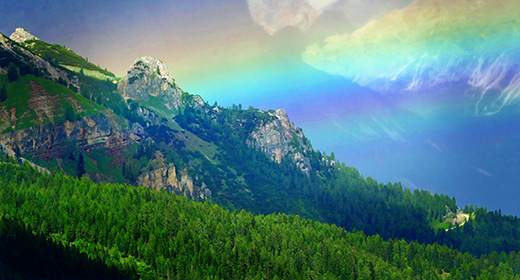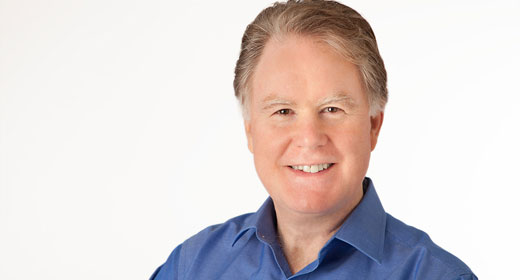by Donna Quesada: We, the descendants of the Age of Reason, have been nurtured to raise a suspicious eyebrow at suggestions

like have faith, or, trust the universe, or worse, let go & let God, because it insults our conviction in the power of our own free will…our capacity to be self-determined, autonomous individuals…masters of our own destiny…captains of our ship.
Then, by means of direct experience with the tumultuous and liberating changes that occurred throughout the sixties, or else by dint of our good fortune in happening upon a teacher, some of us became “spiritual.”
Part of being spiritual is the realization of our inter-connection with the world, and by extension, our influence on it; through every action, every word, and even every thought, we affect everything in known and unknown ways. Coming out of a God-fearing era, in which one didn’t dare assert one’s power over the mysterious workings of the divine, this was huge. By reclaiming our power, we assumed our role as creator, or at least co-creator. And we liked it. We took to the idea of manifestation like a cat takes to a newly-emptied box. It pleased our sense of doing and gratified our need for control. After all, if we can simply choose our thoughts and direct our intention, then we can shape the world we want to live in.
We can’t stop our thoughts, the reasoning went, so we might as well learn to master them and so we willfully embraced our role as co-creator of our destiny. The idea of activating our ability to manifest tangible things, like cars and money, as well as the more elusive intangibles, like health and well-being, made us feel powerful.
I eagerly stepped onto the bandwagon.
But, then I asked, what if this, too, were but a stepping stone, a bridge, to a more exalted plateau, still? What if, all of life amounted to this one question:
Can you release even that—the need to make choices at all… can you release the need to co-create?
In other words, can you say yes to life on its own terms?
But, rather than seeing it as a denial of free will, why not look upon this gesture of renunciation, as “the ultimate act of free will?”…as the most courageous choice there is, which is to melt away, that you may move about, like two feathers on a bird, where no difference exists between your will and divine will.
Yogis have always been renunciates. And by Yogis, I mean all seekers, who have abandoned material comforts, mundane temptations and distractions in their passion to find God. So intrinsically a part of spiritual life, renunciation is considered to be the final stage of life in India’s religious traditions.
I propose that the truest gesture of renunciation is internal, rather than external, which is to say, unseen. It is implied in our courage to let go of even the pretense of control. And to the extent of our willingness and ability to do this—to truly surrender—we are Yogis without necessarily looking like Yogis…Yogis as householders…as ordinary people in ordinary surroundings, wearing ordinary clothes, doing ordinary things.
The only thing extraordinary (but doesn’t have to be extraordinary) is the degree of presence one brings to one’s life, since presence is proportional to the extent of surrender, as every wily attempt by the mind, to grasp at anything, is a step out of this moment.
I am reminded of an old Zen Koan about the man who encountered a tiger.
A man was traveling by foot, when all of a sudden, a tiger came running after him. When he reached a precipice, and could run no more, he caught hold of a wild vine and swung himself down over the edge. The tiger sniffed at him from above. Trembling, he looked down to where, far below, another tiger was waiting to eat him. As if things couldn’t get worse, he then noticed two mice, gnawing away the vine; the only thing that sustained him. It was at that very moment, that the man noticed a luscious strawberry within reach, so he ate it. How sweet it tasted!
Can we laugh at the ultimate paradox of life? The exquisite beauty that exists within and alongside the ephemeral. The moment we try to possess it, it vanishes.
Like the man hanging off the cliff, we all have the ability to “transcend” our situations and dramas, but that transcendence is discovered through the relinquishment of our perceived identities in this life, especially our role as the “doer.” More profoundly, it is expressed through our willingness to offer up thanks and laugh with the beauty and apparent absurdity of it all. But really what we’re doing is giving the whole thing over to a higher power.
And, “giving it over” isn’t to “give up,” in the ordinary sense, it’s rather, to begin to relate to a larger field of creation. Giving up, in the ordinary sense is the ego’s way of saying, in a passive-aggressive voice, “I can’t have my own way,” so I’ll act like I never wanted it, anyway.” There’s a lurking resentment there. Whereas, in the truest form of surrender, it is of the soul, rather than the ego. It is not only to identify with a larger—so large so as to be infinite—perspective, but to come into a genuine state of allowing. It’s as if the you, that you thought you knew, disappears into this infinite self. So that you are nothing, but at the same time, everything.
And this expansion occurs to the point where, even your need to figure things out, e.g., the hows & the whys, begins to fade. You just trust. It’s not that you trust any being in particular…you just trust. It’s a state of being.
And this brings us back to the ultimate act of free will; it’s a choice to trust. To trust that everything is going to be OK…that everything is already OK…that everything is unfolding just as it should….that even this tempest you’re in the middle of right now, is part of it all…and it’s perfect. It’s to know that the workings of the divine, and your purpose within it all, is beyond what the mind can comprehend.
So, you just live. And, like the man on the precipice, rather than trying to figure it out or outsmart the process, or improve God’s timing, you surrender to this moment and eat the strawberry. And everything is delicious. And perfect…as it is.









































